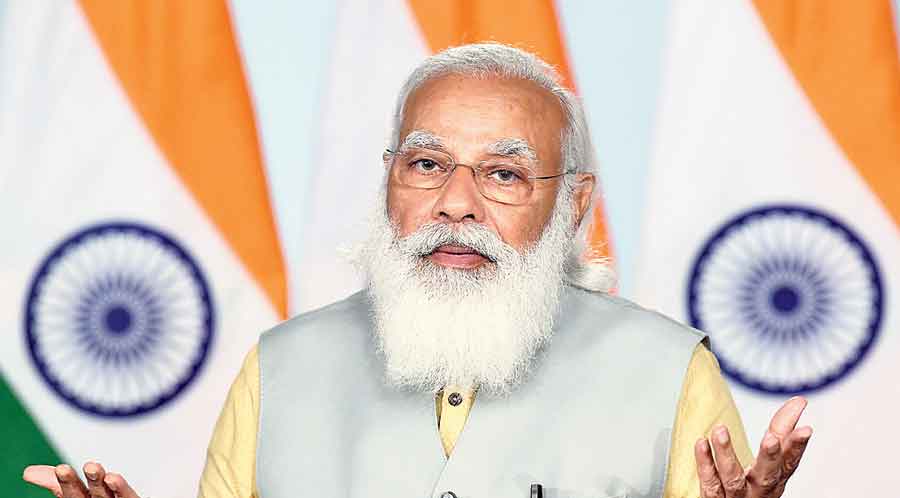A tale of contrasts is unfolding not far from poll-bound Bengal — while Bangladesh Prime Minister Sheikh Hasina is earning respect for seamlessly taking a domestic celebration to international heights amid a pandemic, Narendra Modi will be crossing the border with an apparent eye on a state election.
Hasina will receive Modi at Dhaka this Friday after having hosted several heads of state like President of the Maldives Ibrahim Mohamed Solih, Sri Lankan Prime Minister Mahinda Rajapaksa, Nepalese President Bidya Devi Bhandari and Bhutanese Prime Minister Lotay Tshering over the past five days.
The world leaders are guests at the Bangladesh government’s celebration of the birth centenary of Bangabandhu Sheikh Mujibur Rahman and 50 years of the Liberation War that created Bangladesh.
Although there are several pending bilateral issues — ranging from an agreement on Teesta water-sharing to expanding the scope of trade — between the two countries, the Indian Prime Minister’s visit to Bangladesh has not sparked any expectations in the neighbouring country.
On the contrary, expectations are high on this side of the border as Modi’s party is locked in a crucial battle with Mamata Banerjee’s Trinamul for the seat of power in Bengal. The BJP is hoping to reap political dividends from Modi’s Bangladesh trip, especially in the context of the crucial Matua vote bank back home.

Narendra Modi PTI
Modi will be the guest of honour during the National Day programme on March 26. On Day One of his trip, he will also hold meetings with Hasina, Bangladesh President Mohammed Abdul Hamid and foreign minister A.K. Abdul Momen.
It is the Day Two itinerary that appears to hold the kernel of the Indian Prime Minister’s trip to Bangladesh. Modi will be visiting temples, travelling outside Dhaka to visit the Jeshoreshwari Kali temple at Satkhira and also offer prayers at a temple in Orakandi, a sacred place of worship for the Matuas on both sides of the border.
“Anyone can understand that the Prime Minister is going to Bangladesh to visit temples, which will not only facilitate the BJP’s polarisation agenda along religious lines but will also woo the Matuas,” a retired Indian diplomat said.
The Matuas, lower caste Hindu immigrants from Bangladesh, play a key role in deciding the poll outcome in 30-odd Assembly seats in North 24-Parganas and Nadia. Although the community had voted en-masse for the BJP in the 2019 Lok Sabha elections, sections within the community are now sulking because of the delay in the implementation of the Citizenship Amendment Act as promised by the party.
“The Prime Minister’s proposed visit to Orakandi, which is a sacred pilgrimage for us, will really help us politically in the Assembly polls,” said Subrata Thakur, a Matua leader and the BJP nominee for the Gaighata seat in North 24-Parganas.
Subrata’s brother Shantanu, the BJP MP from Bongaon and the president of the All India Matua Mahasangha, and a few other members of the family who are descendents of Harichand Thakur, the founder of the Matua sect, will accompany Modi during his temple trips in Bangladesh.
“With his visit to Orakandi, the Prime Minister will send out a message that he is with the Matua community,” added Subrata.
The fact that Modi’s trip to Bangladesh has not created the usual buzz is clear from the coverage in the local media. Unlike in the past, there are no discussions on what the trip would yield for Bangladesh.
The gracious hosts in Bangladesh are not talking openly about their lack of expectations — there are no bilateral meetings lined up during the trip — but in private some are saying they are aware of the reasons behind Modi’s visit against the backdrop of the elections in Bengal.
This departure from the usual dynamics of an Indian Prime Minister’s visit to Bangladesh is defining the tale of the two leaders from the sub-continent.
“Despite the pandemic, Hasina has managed to expand the scope of the celebrations in the country and got so many leaders to Dhaka…. This has indeed raised her stature,” said a retired Bangladeshi diplomat.
“Our Prime Minister has also done a remarkable job by ensuring social distancing at the highest level by staggering the visits of the heads of state,” the ex-diplomat added.
The strict physical distancing protocol that the Bangladesh government is maintaining — the guest list for the National Day programme has also been selective — is not the only good news for Modi.
Despite overtures from Pakistan, which is trying to court Hasina, none from Islamabad has been invited to the 10-day celebrations.
“I can’t predict what will transpire between the two Prime Ministers when they meet, but I strongly think that India should take advantage of the visit to come up with something more concrete on the highly sensitive issue of water-sharing…. Simple promises of solutions will not be enough as we have been waiting for a breakthrough for around a decade,” said the former Bangladeshi diplomat.
A former Indian diplomat, however, said New Delhi couldn’t probably have asked for bilateral meetings when the Prime Minister had been invited to take part in the celebrations. He also questioned the perception that Modi’s visit is linked to the Bengal elections.
“I think that the Prime Minister is trying to give some confidence to the Hindu community in Bangladesh as they are often under attack from fundamentalist forces.… This attempt to boost the morale of the Hindus in Bangladesh is a welcome step,” said the former diplomat.











